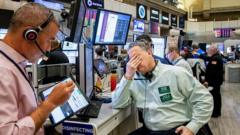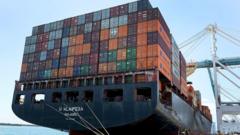Concerns over tariffs and potential economic decline lead to significant sell-off in U.S. Treasury bonds.
**Trump's Tariffs Trigger Turmoil in U.S. Debt Markets**

**Trump's Tariffs Trigger Turmoil in U.S. Debt Markets**
Investors react as government bond rates surge amidst escalating trade tensions.
The impact of President Donald Trump's newly imposed tariffs is generating alarm amongst investors, leading to a major sell-off in U.S. government debt. As the interest rate on U.S. Treasury bonds ascended sharply this Wednesday, confidence in the U.S. economy appeared to be wavering. Effective at midnight, the tariffs on imports from around 60 nations have intensified the ongoing trade conflict with China, following a staggering 104% tax on goods from the Asian nation, which has prompted China to retaliate with an 84% levy on American products.
In response to these tariffs, the U.S. stock market has shown considerable decline, and the bond sell-off adds yet another layer of complexity to the financial landscape. Traditionally perceived as a "safe haven" for investors, U.S. Treasuries found their yields hitting the highest point since February, reaching 4.5%. This sudden spike in yields marks a troubling trend, with the rate for borrowing over a decade rising from 3.9% just days ago.
Analysts are speculating about the possibility of the Federal Reserve stepping in if market turbulence persists, which would be reminiscent of emergency measures taken by the Bank of England in 2022. Deutsche Bank's George Saravelos stated, "We see no other option for the Fed but to step in with emergency purchases of U.S. Treasuries to stabilise the bond market."
Economist Simon French emphasized the precarious state of the economy, suggesting that there is a significant chance of a recession, notably raising the likelihood from 40% to 60% according to JP Morgan. Trump’s tariffs threaten to disrupt global supply chains, and U.S.-based companies may push higher costs onto consumers, thus exacerbating inflation.
As speculation swirls regarding the identity of investors unloading U.S. bonds, some analysts suggest foreign nations, particularly China—holding $759 billion in U.S. Treasuries—might be involved. Saravelos cautioned that the potential for escalating tensions could lead to a financial war over asset ownership between the two nations, warning, "There can be no winner," contrasting this with an inevitable decline in the global economy.






















